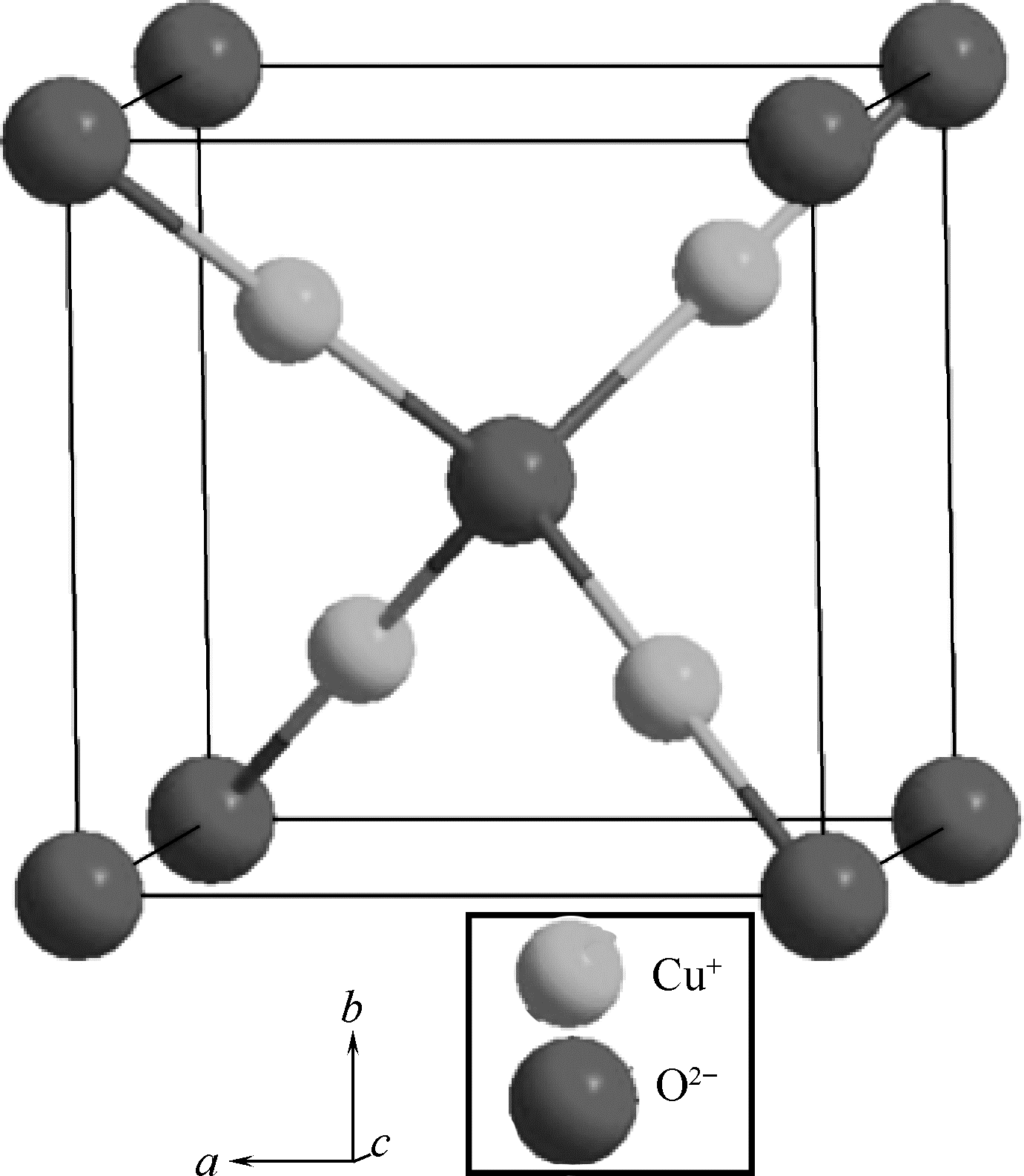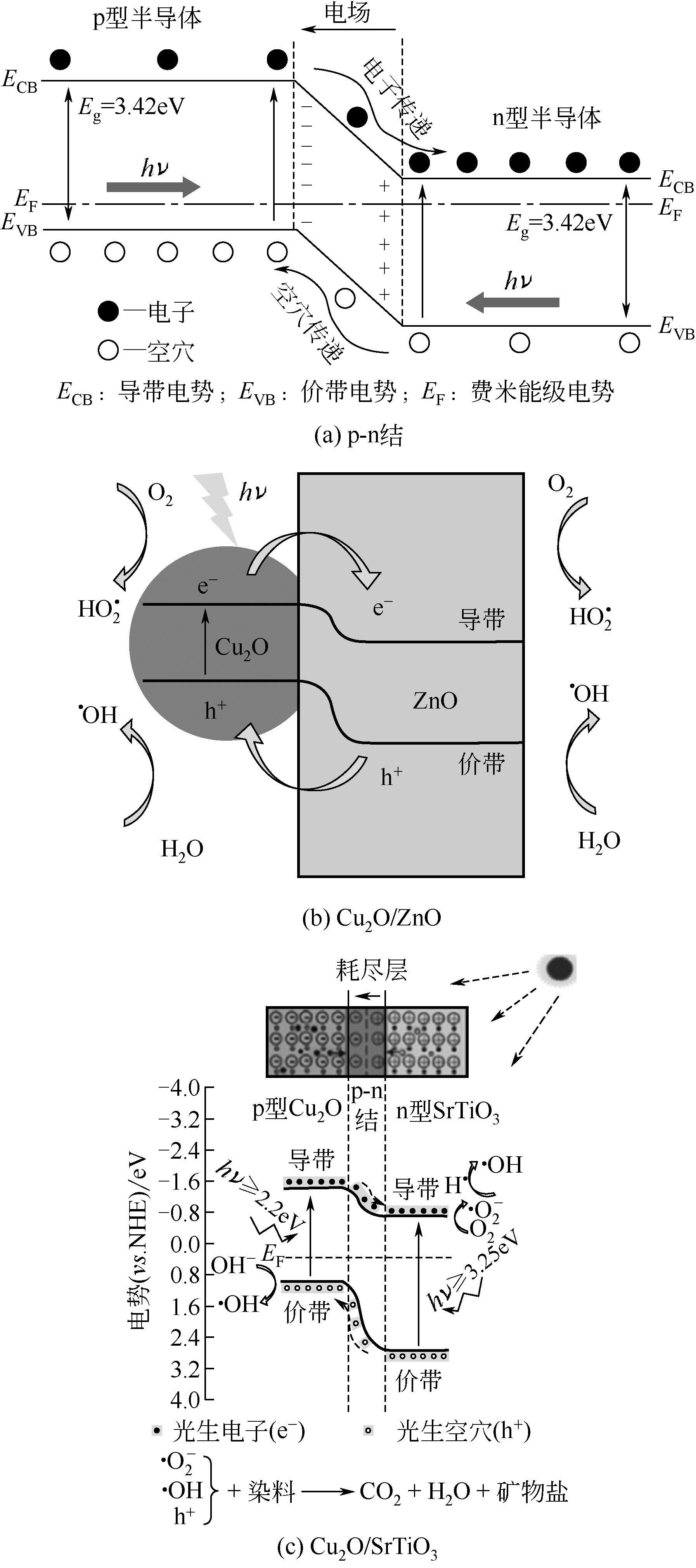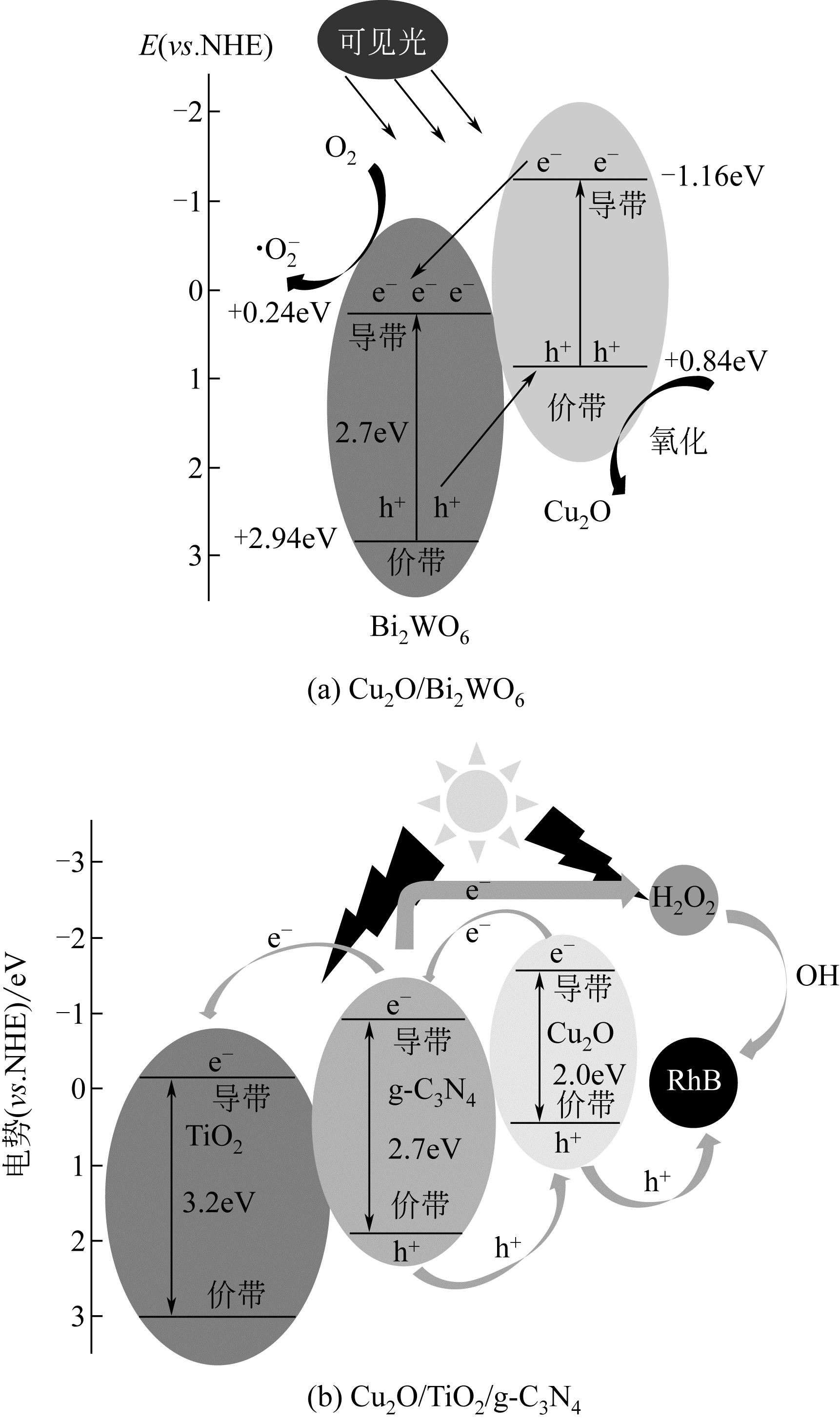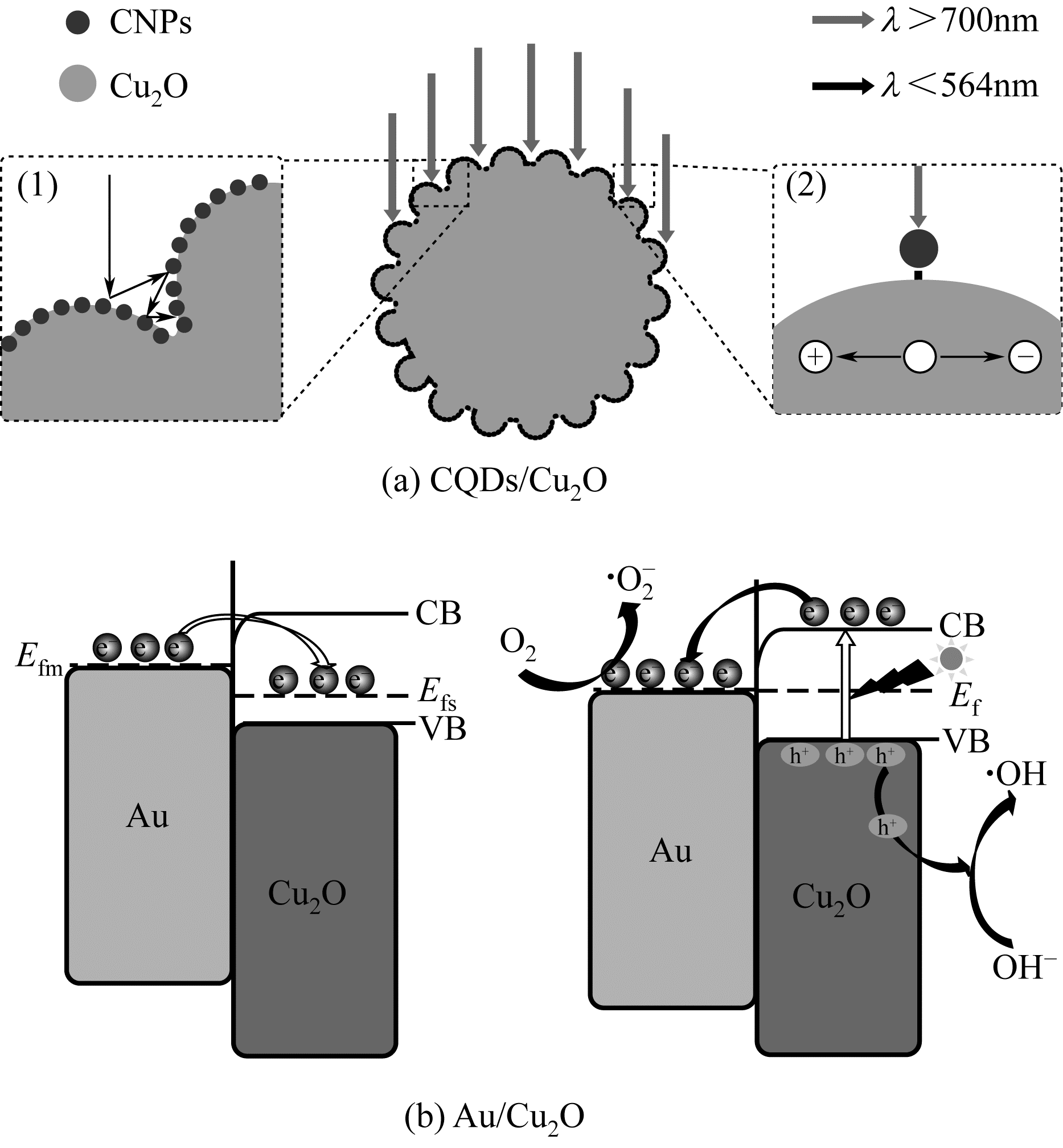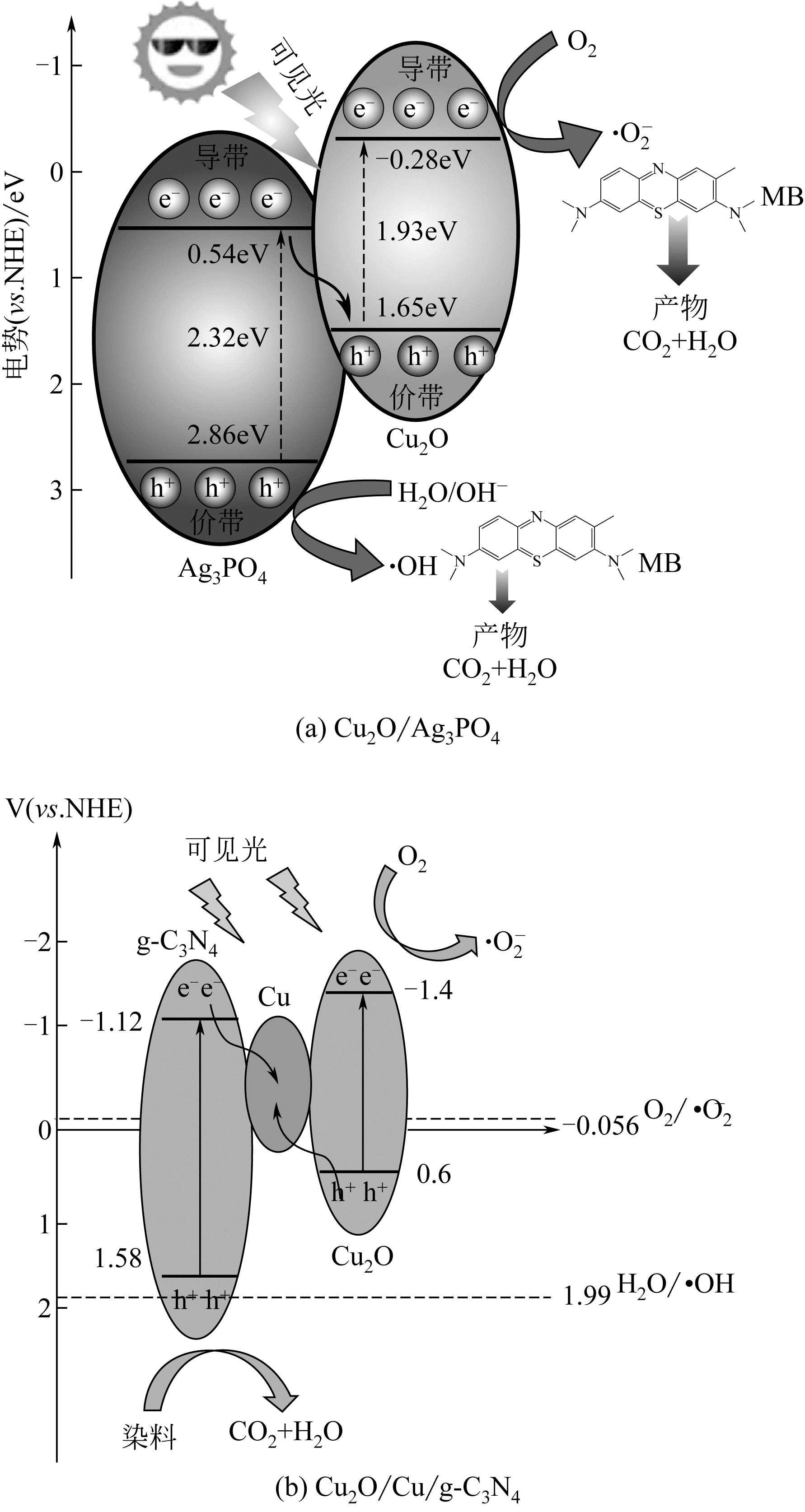化工进展 ›› 2019, Vol. 38 ›› Issue (06): 2756-2767.DOI: 10.16085/j.issn.1000-6613.2018-1645
氧化亚铜光催化剂性能提升及增强机制的研究进展
龙丹( ),周俊伶,时洪民,王冠然,李红双,赵苾艺,李贞玉(
),周俊伶,时洪民,王冠然,李红双,赵苾艺,李贞玉( )
)
- 长春工业大学化学工程学院,吉林 长春 130012
-
收稿日期:2018-08-10出版日期:2019-06-05发布日期:2019-06-05 -
通讯作者:李贞玉 -
作者简介:龙丹(1993—),女,硕士研究生,研究方向为功能材料。E-mail:<email>danlong175201@163.com</email>。 -
基金资助:吉林省自然科学基金(20160101322JC);吉林省教育厅“十三五”科学技术研究项目(2016350)
Research progress on the improved performance of cuprous oxide photocatalyst and its enhancement mechanism
Dan LONG( ),Junling ZHOU,Hongmin SHI,Guanran WANG,Hongshuang LI,Biyi ZHAO,Zhenyu LI(
),Junling ZHOU,Hongmin SHI,Guanran WANG,Hongshuang LI,Biyi ZHAO,Zhenyu LI( )
)
- School of Chemical Engineering,Changchun University of Technology,Changchun 130012,Jilin,China
-
Received:2018-08-10Online:2019-06-05Published:2019-06-05 -
Contact:Zhenyu LI
摘要:
Cu2O是目前最有潜力的可见光光催化剂之一,在太阳能电池、一氧化碳氧化、光催化剂、传感器、化学模板等方面有着广泛的应用。然而,Cu2O光生电子-空穴对具有容易复合、易发生光腐蚀、稳定性不好等特性,使其在实际应用上面临很大的挑战,因此如何有效地提高Cu2O的光催化性能成为国内外研究者关注的焦点。首先,本文围绕Cu2O半导体的形貌控制、杂原子掺杂以及构建半导体异质结这三方面对Cu2O光催化性能的提升进行系统阐述,其中构建半导体异质结是提升Cu2O光催化性能最有效的方法,Cu2O与贵金属、金属氧化物以及碳材料构成的复合半导体异质结均有效地提高了Cu2O的光催化活性;其次,从复合半导体异质结、肖特基结以及Z-scheme机制三方面分析并讨论了Cu2O光催化增强机制;最后对Cu2O基纳米复合材料在电子结构、界面性质以及表面负载的成分和厚度等方面的研究进行了展望。
中图分类号:
引用本文
龙丹, 周俊伶, 时洪民, 王冠然, 李红双, 赵苾艺, 李贞玉. 氧化亚铜光催化剂性能提升及增强机制的研究进展[J]. 化工进展, 2019, 38(06): 2756-2767.
Dan LONG, Junling ZHOU, Hongmin SHI, Guanran WANG, Hongshuang LI, Biyi ZHAO, Zhenyu LI. Research progress on the improved performance of cuprous oxide photocatalyst and its enhancement mechanism[J]. Chemical Industry and Engineering Progress, 2019, 38(06): 2756-2767.
| 光催化剂 | 添加量/mg | MO/mg·L-1 | 降解率/% | 光照时间/min | 光源 | 参考文献 | |
|---|---|---|---|---|---|---|---|
| Ni-Cu2O纳米线 | 20 | 20 | 94 | 80 | 300W 氙灯 (λ > 420nm) | [ | |
| Cu@Cu2O核壳 | 4 | 20 | 90 | 100 | 太阳光(300~2500nm) | [ | |
| 中空Cu@Cu2O | 10 | 100 | 92 | 30 | 500W 氙灯 (λ > 400nm) | [ | |
| Cu-Cu2O多面体 | 150 | 10 | 约为80 | 90 | 500W 氙灯(λ≥400nm) | [ | |
| Au@Cu2O八面体 | 10.6 | 13 | 91 | 40 | 500W 氙灯(λ > 400nm) | [ | |
| Ag/Cu2O类花状 | 40 | 30 | 81.2 | 40 | 500W 氙灯(λ > 400nm) | [ | |
表1 不同形貌金属- Cu2O异质结构光催化剂的光降解MO的性能比较
| 光催化剂 | 添加量/mg | MO/mg·L-1 | 降解率/% | 光照时间/min | 光源 | 参考文献 | |
|---|---|---|---|---|---|---|---|
| Ni-Cu2O纳米线 | 20 | 20 | 94 | 80 | 300W 氙灯 (λ > 420nm) | [ | |
| Cu@Cu2O核壳 | 4 | 20 | 90 | 100 | 太阳光(300~2500nm) | [ | |
| 中空Cu@Cu2O | 10 | 100 | 92 | 30 | 500W 氙灯 (λ > 400nm) | [ | |
| Cu-Cu2O多面体 | 150 | 10 | 约为80 | 90 | 500W 氙灯(λ≥400nm) | [ | |
| Au@Cu2O八面体 | 10.6 | 13 | 91 | 40 | 500W 氙灯(λ > 400nm) | [ | |
| Ag/Cu2O类花状 | 40 | 30 | 81.2 | 40 | 500W 氙灯(λ > 400nm) | [ | |
| 光催化剂 | E VB /eV | E CB/eV | E g/eV | 参考文献 | 光催 化剂 | E VB /eV | E CB/eV | E g/eV | 参考文献 |
|---|---|---|---|---|---|---|---|---|---|
| Ti2O | 2.91 | -0.29 | 3.2 | [ | Ag3PO4 | 2.67 | +0.25 | 2.42 | [ |
| ZnO | 3.0 | -0.2 | 3.2 | [ | Bi2O3 | 3.13 | +0.33 | 2.8 | [ |
| CdS | 1.88 | -0.52 | 2.4 | [ | C3N4 | 1.57 | -1.13 | 2.7 | [ |
| Ce2O | 2.56 | -0.44 | 3.0 | [ | Cu2O | 0.9 | -1.3 | 2.2 | [ |
表2 对比几种常见的光催化剂能价带
| 光催化剂 | E VB /eV | E CB/eV | E g/eV | 参考文献 | 光催 化剂 | E VB /eV | E CB/eV | E g/eV | 参考文献 |
|---|---|---|---|---|---|---|---|---|---|
| Ti2O | 2.91 | -0.29 | 3.2 | [ | Ag3PO4 | 2.67 | +0.25 | 2.42 | [ |
| ZnO | 3.0 | -0.2 | 3.2 | [ | Bi2O3 | 3.13 | +0.33 | 2.8 | [ |
| CdS | 1.88 | -0.52 | 2.4 | [ | C3N4 | 1.57 | -1.13 | 2.7 | [ |
| Ce2O | 2.56 | -0.44 | 3.0 | [ | Cu2O | 0.9 | -1.3 | 2.2 | [ |
| 光催化剂 | 制备 | 形貌 | 性能提升 | 增强机制 | 参考文献 |
|---|---|---|---|---|---|
| Cu2O/ZnO | 简单水热法和电沉积法 | 纳米棒 | 在可见光照射下5h后,Cu2O/ZnO对MO 的降解率是纯Cu2O纳米棒的20倍 | 增大了表面积;增强了光吸收范围;p-n异质结有效地分离了光生电子空穴对 | [ |
| Cu2O/SrTiO3 | 溶胶-凝胶法和溶液还原法 | 纳米颗粒 | 在可见光下照射80min后,对MB 光降解率是Cu2O的3倍,是SrTiO3的1.5倍 | 形成p-n异质结加速光生电荷载体的 分离和迁移 | [ |
| Cu2O/SnO2 | 简单的水热 浸渍法 | 纳米球 | 在可见光下照射90min后,对RhB 的降解速率比单个SnO2和混合相Cu2O高近2倍 | p-n结的形成增强了光响应;促进了光生电子空穴的分离;比表面积和孔隙率增大 | [ |
| Cu2O/Bi2WO6 | 界面自组装法 | 类花状 | 在可见光下照射120min后,Cu2O/Bi2WO6对MB 的降解率是纯Bi2WO6和Cu2O的2.14倍和12.25倍 | 可见光吸收效率的提高;紧密接触界面中的强相互作用有效地提高光生电荷分离 | [ |
| Cu2O/TiO2/ g-C3N4 | 简单的化学法 | 纳米颗粒(NPs) | 在可见光照射下,在3 ~ 15min可使 RhB、MB和MO变色 | 匹配能带以及p-n结的形成 | [ |
| CQDs/Cu2O | 一步超声处理法 | 纳米球 | 在近红外光照下(λ> 700nm、240min),对MB 的降解率可达90%,而纯CQDs和Cu2O均不足3% | 形成肖特基能垒,阻止了光生电子- 空穴对的重组 | [ |
| Au/Cu2O | 低温化学法;简单的化学法 | Au NPs沉积在Cu2O微晶表面 | 在可见光下照射90min,对MO 的光降解率以及光解水是纯Cu2O微球的1.2倍 | Au和Cu2O界面形成肖特基能垒,在内电场的作用下,有效地促进了光生电子和 空穴的分离 | [ |
| Cu2O/Ag3PO4 | 简单的化学法 | 八面体 | 在可见光照射下(8min)对MB 的光降解速率分别为Cu2O和Ag3PO4的7倍和2.1倍 | Z-scheme机理;光生载流子的有效分离 | [ |
| Cu2O/Cu/g-C3N4 | 一步还原法 | Cu2O/Cu NPs沉积在g-C3N4表面 | 在可见光照射下(60min),对MO的光催化降解率分别是P25 TiO2、g-C3N4和Cu2O/Cu的9倍、3.3倍和2倍 | Z-scheme电荷转移机理;Cu 为电荷分离中心 | [ |
表3 不同光降解机制的对比
| 光催化剂 | 制备 | 形貌 | 性能提升 | 增强机制 | 参考文献 |
|---|---|---|---|---|---|
| Cu2O/ZnO | 简单水热法和电沉积法 | 纳米棒 | 在可见光照射下5h后,Cu2O/ZnO对MO 的降解率是纯Cu2O纳米棒的20倍 | 增大了表面积;增强了光吸收范围;p-n异质结有效地分离了光生电子空穴对 | [ |
| Cu2O/SrTiO3 | 溶胶-凝胶法和溶液还原法 | 纳米颗粒 | 在可见光下照射80min后,对MB 光降解率是Cu2O的3倍,是SrTiO3的1.5倍 | 形成p-n异质结加速光生电荷载体的 分离和迁移 | [ |
| Cu2O/SnO2 | 简单的水热 浸渍法 | 纳米球 | 在可见光下照射90min后,对RhB 的降解速率比单个SnO2和混合相Cu2O高近2倍 | p-n结的形成增强了光响应;促进了光生电子空穴的分离;比表面积和孔隙率增大 | [ |
| Cu2O/Bi2WO6 | 界面自组装法 | 类花状 | 在可见光下照射120min后,Cu2O/Bi2WO6对MB 的降解率是纯Bi2WO6和Cu2O的2.14倍和12.25倍 | 可见光吸收效率的提高;紧密接触界面中的强相互作用有效地提高光生电荷分离 | [ |
| Cu2O/TiO2/ g-C3N4 | 简单的化学法 | 纳米颗粒(NPs) | 在可见光照射下,在3 ~ 15min可使 RhB、MB和MO变色 | 匹配能带以及p-n结的形成 | [ |
| CQDs/Cu2O | 一步超声处理法 | 纳米球 | 在近红外光照下(λ> 700nm、240min),对MB 的降解率可达90%,而纯CQDs和Cu2O均不足3% | 形成肖特基能垒,阻止了光生电子- 空穴对的重组 | [ |
| Au/Cu2O | 低温化学法;简单的化学法 | Au NPs沉积在Cu2O微晶表面 | 在可见光下照射90min,对MO 的光降解率以及光解水是纯Cu2O微球的1.2倍 | Au和Cu2O界面形成肖特基能垒,在内电场的作用下,有效地促进了光生电子和 空穴的分离 | [ |
| Cu2O/Ag3PO4 | 简单的化学法 | 八面体 | 在可见光照射下(8min)对MB 的光降解速率分别为Cu2O和Ag3PO4的7倍和2.1倍 | Z-scheme机理;光生载流子的有效分离 | [ |
| Cu2O/Cu/g-C3N4 | 一步还原法 | Cu2O/Cu NPs沉积在g-C3N4表面 | 在可见光照射下(60min),对MO的光催化降解率分别是P25 TiO2、g-C3N4和Cu2O/Cu的9倍、3.3倍和2倍 | Z-scheme电荷转移机理;Cu 为电荷分离中心 | [ |
| 1 | FUJISHIMA A , HONDA K . Electrochemical photolysis of water at a semiconductor electrode[J]. Nature, 1972, 238(5358): 37-38. |
| 2 | KUMAR S G , DEVI L G . Review on modified TiO2 photocatalysis under UV/visible light: selected results and related mechanisms on interfacial charge carrier transfer dynamics[J]. J.Phys.Chem.A, 2011, 115(46): 13211-13241. |
| 3 | DAGHRIR R , DROGUI P , ROBERT D . Modified TiO2 for environmental photocatalytic applications: a review[J]. Ind. Eng. Chem. Res., 2013, 52(10): 3581-3599. |
| 4 | ZHANG L S , WANG W Z , YANG J O , et al . Sonochemical synthesis of nanocrystallite Bi2O3 as a visible-light-driven photocatalyst[J]. Appl. Catal. A-Gen., 2006, 308(7): 105-110. |
| 5 | HARA M , KONDO T , KOMODA M , et al . Cu2O as a photocatalyst for overall water splitting under visible light irradiation[J]. Chem. Commun., 1998, 3(3): 357-358. |
| 6 | BAO N Z , SHEN L M , TAKATA T , et al . Self-templated synthesis of nanoporous CdS nanostructures for highly efficient photocatalytic hydrogen production under visible light[J]. Chem. Mater., 2008, 39(20): 110-117. |
| 7 | CHEN Y J , LIU D P , HUANG Y L , et al . Theoretical model validation study of variable cross-section upright tubular bubble pump[J]. Acta Energiae Solaris Sinica, 2016 (4): 917-923. |
| 8 | WANG X , MAEDA K , THOMAS A , et al . A metal-free polymeric photocatalyst for hydrogen production from water under visible light[J]. Nat. Mater., 2009, 8(1): 76-80. |
| 9 | BAO H , ZHANG W , HUA Q , et al . Crystal-plane-controlled surface restructuring and catalytic performance of oxide nanocrystals[J]. Angew. Chem. Int. Ed., 2015, 50(51): 12294-12298. |
| 10 | C-H KUO , HUANG M H . Morphologically controlled synthesis of Cu2O nanocrystals and their properties[J]. Nano Today, 2010, 5(2): 106-116. |
| 11 | LU L , XU X , YAN J , et al . Oxygen vacancy rich Cu2O based composite material with nitrogen doped carbon as matrix for photocatalytic H2 production and organic pollutant removal[J]. Dalton Trans., 2018, 47(6): 2031-2038. |
| 12 | SINGH M , JAMPAIAH D , KANDJANI A E , et al . Oxygen-deficient photostable Cu2O for enhanced visible light photocatalytic activity[J]. Nanoscale, 2018, 10(13): 6039-6050. |
| 13 | HUA Q , CHEN K , CHANG S , et al . Crystal plane-dependent compositional and structural evolution of uniform Cu2O nanocrystals in aqueous ammonia solutions[J]. J. Mater. Chem. C, 2011, 115(42): 20618-20627. |
| 14 | SUN S , ZHANG H , TANG L , et al . One-pot fabrication of novel cuboctahedral Cu2O crystals enclosed by anisotropic surfaces with enhancing catalytic performance[J]. Phys. Chem. Chem. Phys., 2014, 16(38): 20424-20428. |
| 15 | ZHANG Y , DENG B , ZHANG T , et al . Shape effects of Cu2O polyhedral microcrystals on photocatalytic activity[J]. J.Phys.Chem.C, 2010, 114: 5073-5079. |
| 16 | CHEN D S , YU W B , DENG Z , et al . Hollow Cu2O microspheres with two active {111} and {110} facets for highly selective adsorption and photodegradation of anionic dye[J]. RSC Adv., 2015, 5(68): 55520-55526. |
| 17 | ZHENG H Y , QIN L Z , LIN H , et al . Convenient route to well-dispersed Cu2O nanospheres and their use as photocatalysts[J]. J. Nanosci. Nanotechnol., 2015, 15(8): 6063-6069. |
| 18 | MENG X Y , TIAN G H , CHEN Y J , et al . Room temperature solution synthesis of hierarchical bow-like Cu2O with high visible light driven photocatalytic activity[J]. RSC Adv., 2012, 2(7): 2875-2881. |
| 19 | ZHANG W X , YANG X N , ZHU Q , et al . One-pot room temperature synthesis of Cu2O/Ag composite nanospheres with enhanced visible-light-driven photocatalytic performance[J]. Ind. Eng. Chem. Res., 2014, 53(42): 16316-16323. |
| 20 | XIA Y M , HE Z M , HU K J , et al . Fabrication of n-SrTiO3/p-Cu2O heterojunction composites with enhanced photocatalytic performance[J]. J. Alloy. Compd., 2018, 753: 356-363. |
| 21 | YAN X R , XU R P , GUO J K , et al . Enhanced photocatalytic activity of Cu2O/g-C3N4 heterojunction coupled with reduced graphene oxide three-dimensional aerogel photocatalysis[J]. Mater. Res. Bull., 2017, 96: 18-27. |
| 22 | LI X L , MA Y J, YANG Z , et al . Hierarchical heterostructures based on prickly Ni nanowires/Cu2O nanoparticles with enhanced photocatalytic activity[J]. Dalton Trans., 2016, 45(17): 7258-7266. |
| 23 | ZHANG Y X , ZHOU X B , ZHAO Y Y , et al . One-step solvothermal synthesis of interlaced nanoflake-assembled flower-like hierarchical Ag/Cu2O composite microspheres with enhanced visible light photocatalytic properties[J]. RSC Adv., 2017, 7(12): 6957-6965. |
| 24 | KOU T , JIN C , ZHANG C , et al . Nanoporous core-shell Cu@Cu2O nanocomposites with superior photocatalytic properties towards the degradation of methyl orange[J]. RSC Adv., 2012, 2(33): 12636-12643. |
| 25 | ZOU X , FAN H , TIAN Y , et al . Microwave-assisted hydrothermal synthesis of Cu/Cu2O hollow spheres with enhanced photocatalytic and gas sensing activities at room temperature[J]. Dalton Trans., 2015, 44(17): 7811-7821. |
| 26 | SUN S D , KONG C C , YOU H J , et al . Facet-selective growth of Cu-Cu2O heterogeneous architectures[J]. Crystengcomm, 2012, 14(1): 40-43. |
| 27 | KONG L , CHEN W , MA D, et al . Size control of Au@Cu2O octahedra for excellent photocatalytic performance[J]. J.Mater. Chem., 2012, 22(22): 719-724. |
| 28 | CHU C Y , HUANG M H . Facet-dependent photocatalytic properties of Cu2O crystals probed by electron, hole and radical scavengers[J]. J.Mater.Chem. A, 2017, 5(29): 15116-15123. |
| 29 | LIANG Y , SHANG L , BIAN T , et al . Shape-controlled synthesis of polyhedral 50-facet Cu2O microcrystals with high-index facets[J]. Crystengcomm, 2012, 14(13): 4431-4436. |
| 30 | HU F , ZOU Y Z , WANG L L , et al . Photostable Cu2O photoelectrodes fabricated by facile Zn-doping electrodeposition[J]. Int. J. Hydrogen. Energ., 2016, 41(34): 15172-15180. |
| 31 | HERING K P , KANDZIA C , BENZ J , et al . Hydrogen induced mobility enhancement in RF sputtered Cu2O thin films[J]. J.Appl. Phys., 2016, 120(18): 318-326. |
| 32 | HAN X , HE X X , WANG F , et al . Engineering an N-doped Cu2O@N-C interface with long-lived photo-generated carriers for efficient photoredox catalysts[J]. J.Mater.Chem.A, 2017, 5(21): 10220-10226. |
| 33 | ZHU H , DU M L , YU D L , et al . A new strategy for the surface-free-energy-distribution induced selective growth and controlled formation of Cu2O-Au hierarchical heterostructures with a series of morphological evolutions[J]. J.Mater.Chem.A, 2013, 1(3): 919-929. |
| 34 | DENG X L , WANG C G , ZHOU E , et al . One-step solvothermal method to prepare Ag/Cu2O composite with enhanced photocatalytic properties[J]. Nanoscale. Res. Lett., 2016, 11(1): 29-41. |
| 35 | LI L L , CHEN X B , WU Y E , et al . Pd-Cu2O and Ag-Cu2O hybrid concave nanomaterials for an effective synergistic catalyst[J]. Angew. Chem. Int. Ed., 2013, 52(42): 11049-11053. |
| 36 | MOUSAVI-KAMAZANI M , ZARGHAMI Z , RAHMATOLAHZADEH R , et al . Solvent-free synthesis of Cu-Cu2O nanocomposites via green thermal decomposition route using novel precursor and investigation of its photocatalytic activity[J]. Adv. Powder. Technol., 2017, 28(9): 2078-2086. |
| 37 | TAO S , YANG M , CHEN H H , et al . Microfluidic synthesis of Ag@Cu2O core-shell nanoparticles with enhanced photocatalytic activity[J]. J. Colloid. Interf. Sci., 2017, 486: 16-26. |
| 38 | YIN H Y , WANG X L , WANG L , et al . Cu2O/TiO2 heterostructured hollow sphere with enhanced visible light photocatalytic activity[J]. Mater. Res. Bull., 2015, 72: 176-183. |
| 39 | SHAO Z F , WANG Y , ZHANG Y F , et al . Electrochemical deposition synthesis of ZnO-NA/Cu2O-NPs type-II hierarchical heterojunction for enhanced photoelectrochemical degradation of methyl orange (MO)[J]. J.Photoch.Photobio.A, 2018, 364: 657-670. |
| 40 | CUI G L , XIAO C H , ZHANG P H , et al . In situ electrodeposition of a Cu2O/SnO2 periodical heterostructure film for photosensor applications[J]. Phys. Chem. Chem. Phys., 2016, 18(16): 10918-10923 |
| 41 | SONG J H , RODENBOUGH P P , XU W Q , et al .Reduction of nano-Cu2O: crystallite size dependent and the effect of nano-ceria support[J]. J.Phys.Chem.C, 2015, 119(31): 17667-17672. |
| 42 | CUI W Q , AN W J , LIU L , et al . Novel Cu2O quantum dots coupled flower-like BiOBr for enhanced photocatalytic degradation of organic contaminant[J]. J. Hazard. Mater., 2014, 280: 417-427. |
| 43 | WANG L X , ZHAO F , HAN Q , et al . Spontaneous formation of Cu2O-g-C3N4 core–shell nanowires for photocurrent and humidity responses[J]. Nanoscale, 2015, 7(21): 9694-9702. |
| 44 | LIU L , LIN S L , HU J S , et al . Plasmon-enhanced photocatalytic properties of nano Ag@AgBr on single-crystalline octahedral Cu2O (111) microcrystals composite photocatalyst[J]. Appl. Surf. Sci., 2015, 330(3): 94-103. |
| 45 | CAO J , LI J C , LIU L , et al . One-pot synthesis of novel Fe3O4/Cu2O/PANI nanocomposites as absorbents in water treatment[J]. J.Mater.Chem.A, 2014, 2(21): 7953-7959. |
| 46 | DUBALE A A , TAMIRAT A G , CHEN H M , et al . A highly stable CuS and CuS-Pt modified Cu2O/CuO heterostructure as an efficient photocathode for the hydrogen evolution reaction[J]. J.Mater.Chem.A, 2016, 4(6): 2205-2216. |
| 47 | LI H T , LIU R H , LIU Y , et al . Carbon quantum dots/Cu2O composites with protruding nanostructures and their highly efficient (near) infrared photocatalytic behavior[J]. J.Mater. Chem., 2012, 22(34): 7470-17475. |
| 48 | ZHOU X M , NIE H G , YAO Z , et al . Facile synthesis of nanospindle-like Cu2O/straight multi-walled carbon nanotube hybrid nanostructures and their application in enzyme-free glucose sensing[J]. Sens. Actuators B, 2012, 168: 1-7. |
| 49 | PU Y C , CHOU H Y , KUO W S, et al . Interfacial charge carrier dynamics of cuprous oxide-reduced graphene oxide (Cu2O-rGO) nanoheterostructures and their related visible-light-driven photocatalysis[J]. Appl. Catal. B: Environ., 2017, 204: 21-32. |
| 50 | XU P , SHEN X , LUO L , et al . Preparation of TiO2/Bi2WO6 nanostructured heterojunctions on carbon fibers as a weaveable visible-light photocatalyst /photoelectrode[J]. Environ. Sci.:Nano., 2018, 5(2): 327-337. |
| 51 | GHOSH S , BERA S , BASU R N . Fabrication of Bi2S3/ZnO heterostructures: an excellent photocatalyst for visible-light-driven hydrogen generation and photoelectrochemical properties[J]. New J. Chem., 2018, 42(1): 541-554. |
| 52 | ZHOU P , LE Z , XIE Y , et al . Studies on facile synthesis and properties of mesoporous CdS/TiO2, composite for photocatalysis applications[J]. J. Alloy. Compd., 2017, 692: 170-177. |
| 53 | CHAE B W , AMNA T , HASSAN M S , et al . CeO2-Cu2O composite nanofibers: synthesis, characterization photocatalytic and electrochemical application[J]. Adv. Powder. Technol., 2017, 28(1): 230-235. |
| 54 | MEI J , ZHANG D P , LI N , et al . The synthesis of Ag3PO4/g-C3N4 nanocomposites and the application in the photocatalytic degradation of bisphenol A under visible light irradiation[J]. J. Alloy. Compd., 2018, 749: 715-723. |
| 55 | SHEN H Q , WANG J X , JIANG J H , et al . All-solid-state Z-scheme system of RGO-Cu2O/Bi2O3 for tetracycline degradation under visible-light irradiation[J]. Chem. Eng. J., 2017, 313: 508-517. |
| 56 | ZOU X W , FAN H Q , TIAN Y M , et al . Synthesis of Cu2O/ZnO hetero-nanorod arrays with enhanced visible light-driven photocatalytic activity[J]. CrystEngComm, 2014, 16(6): 1149-1157. |
| 57 | JOSHI S , IPPOLITO S J , SUNKARA M V . Convenient architectures of Cu2O/SnO2 type II p-n heterojunctions and their application in visible light catalytic degradation of rhodamine B[J]. RSC Adv., 2016, 6(49): 43672-43684. |
| 58 | LIU L , DING L , LIU Y G , et al . Enhanced visible light photocatalytic activity by Cu2O-coupled flower-like Bi2WO6 structures[J]. Appl. Surf. Sci., 2016, 364: 505-515. |
| 59 | MIN Z Y , WANG X P , LI Y P , et al . A highly efficient visible-light-responding Cu2O/TiO2/g-C3N4 photocatalyst for instantaneous discolorations of organic dyes[J]. Mater. Lett., 2017, 193: 18-21. |
| 60 | LU Y , XU Y Y , WU Q , et al . Synthesis of Cu2O nanocrystals/TiO2 photonic crystal composite for efficient p-nitrophenol removal[J]. Colloid. Surface A, 2018, 539: 291-300. |
| 61 | LIU L , DING L , AN W J , et al . Cu2O NPs decorated BiPO4 photo-catalyst for enhanced organic contaminant degradation under visible light irradiation[J]. RSC Adv., 2016, 6(35): 29202-29209. |
| 62 | FENG H B , LI Y P , LUO D M , et al . Novel visible-light-responding InVO4-Cu2O-TiO2 ternary nanoheterostructure: preparation and photocatalytic characteristics[J]. Chinese J. Catal., 2016, 37(6): 855-862. |
| 63 | ZHANG W W , WANG B S , HAO C C , et al . Au/Cu2O Schottky contact heterostructures with enhanced photocatalytic activity in dye decomposition and photoelectrochemical water splitting under visible light irradiation[J]. J. Alloy. Compd., 2016, 684: 445-452. |
| 64 | LI Z , DAI K , ZHANG J F , et al . Facile synthesis of novel octahedral Cu2O/Ag3PO4 composite with enhanced visible light photocatalysis[J]. Mater. Lett., 2017, 20: 648-651. |
| 65 | BAO Y C , CHEN K Z . A novel Z-scheme visible light driven Cu2O/Cu/g-C3N4 photocatalyst using metallic copper as a charge transfer mediator[J]. Mol. Catal., 2017, 235: 187-195. |
| 66 | WANG D , PAN X Y , WANG G T , et al . Improved propane photooxidation activities upon nano Cu2O/TiO2 heterojunction semiconductors at room temperature[J]. RSC Adv., 2015, 5(28): 22038-22043. |
| 67 | LI J Q , YUAN H , ZHU Z F . Fabrication of Cu2O/Au/BiPO4 Z-scheme photocatalyst to improve the photocatalytic activity under solar light[J]. J.Mol. Catal. A-Chem., 2015, 410: 133-139. |
| 68 | HE J , SHAO D W , ZHENG L C , et al . Construction of Z-scheme Cu2O/Cu/AgBr/Ag photocatalyst with enhanced photocatalytic activity and stability under visible light[J]. Appl. Catal. B: Environ., 2017, 203: 917-926. |
| [1] | 张明焱, 刘燕, 张雪婷, 刘亚科, 李从举, 张秀玲. 非贵金属双功能催化剂在锌空气电池研究进展[J]. 化工进展, 2023, 42(S1): 276-286. |
| [2] | 时永兴, 林刚, 孙晓航, 蒋韦庚, 乔大伟, 颜彬航. 二氧化碳加氢制甲醇过程中铜基催化剂活性位点研究进展[J]. 化工进展, 2023, 42(S1): 287-298. |
| [3] | 谢璐垚, 陈崧哲, 王来军, 张平. 用于SO2去极化电解制氢的铂基催化剂[J]. 化工进展, 2023, 42(S1): 299-309. |
| [4] | 杨霞珍, 彭伊凡, 刘化章, 霍超. 熔铁催化剂活性相的调控及其费托反应性能[J]. 化工进展, 2023, 42(S1): 310-318. |
| [5] | 郑谦, 官修帅, 靳山彪, 张长明, 张小超. 铈锆固溶体Ce0.25Zr0.75O2光热协同催化CO2与甲醇合成DMC[J]. 化工进展, 2023, 42(S1): 319-327. |
| [6] | 王正坤, 黎四芳. 双子表面活性剂癸炔二醇的绿色合成[J]. 化工进展, 2023, 42(S1): 400-410. |
| [7] | 高雨飞, 鲁金凤. 非均相催化臭氧氧化作用机理研究进展[J]. 化工进展, 2023, 42(S1): 430-438. |
| [8] | 王乐乐, 杨万荣, 姚燕, 刘涛, 何川, 刘逍, 苏胜, 孔凡海, 朱仓海, 向军. SCR脱硝催化剂掺废特性及性能影响[J]. 化工进展, 2023, 42(S1): 489-497. |
| [9] | 邓丽萍, 时好雨, 刘霄龙, 陈瑶姬, 严晶颖. 非贵金属改性钒钛基催化剂NH3-SCR脱硝协同控制VOCs[J]. 化工进展, 2023, 42(S1): 542-548. |
| [10] | 孙玉玉, 蔡鑫磊, 汤吉海, 黄晶晶, 黄益平, 刘杰. 反应精馏合成甲基丙烯酸甲酯工艺优化及节能[J]. 化工进展, 2023, 42(S1): 56-63. |
| [11] | 李梦圆, 郭凡, 李群生. 聚乙烯醇生产中回收工段第三、第四精馏塔的模拟与优化[J]. 化工进展, 2023, 42(S1): 113-123. |
| [12] | 张瑞杰, 刘志林, 王俊文, 张玮, 韩德求, 李婷, 邹雄. 水冷式复叠制冷系统的在线动态模拟与优化[J]. 化工进展, 2023, 42(S1): 124-132. |
| [13] | 王福安. 300kt/a环氧丙烷工艺反应器降耗减排分析[J]. 化工进展, 2023, 42(S1): 213-218. |
| [14] | 陈匡胤, 李蕊兰, 童杨, 沈建华. 质子交换膜燃料电池气体扩散层结构与设计研究进展[J]. 化工进展, 2023, 42(S1): 246-259. |
| [15] | 许友好, 王维, 鲁波娜, 徐惠, 何鸣元. 中国炼油创新技术MIP的开发策略及启示[J]. 化工进展, 2023, 42(9): 4465-4470. |
| 阅读次数 | ||||||
|
全文 |
|
|||||
|
摘要 |
|
|||||
